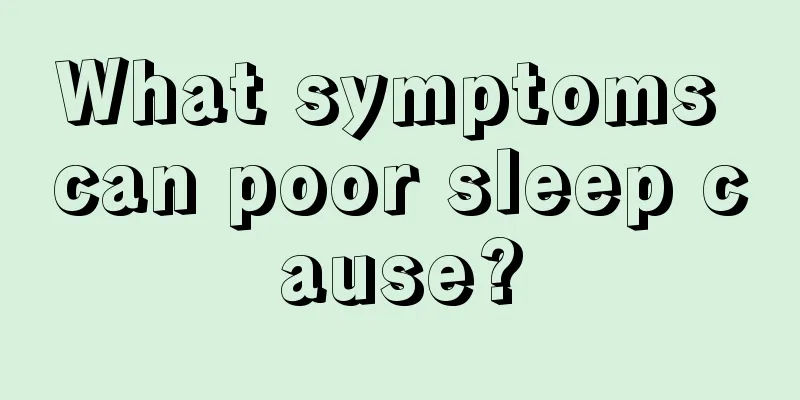What symptoms can poor sleep cause?

|
In fact, there are many people who have poor sleep, but long-term poor sleep will cause adverse harm to physical health, easily leading to a decrease in the body's immunity and gastrointestinal dysfunction, or may induce heart disease and cause obesity. Damage 1: Decreased immunity If you often stay up late, feel tired, and lack energy, your body's immunity will decline, and symptoms of autonomic nervous system disorders such as colds, gastrointestinal infections, and allergies will find you unexpectedly. Moreover, the direct symptoms of staying up late frequently are dizziness, inability to concentrate, and even migraines at work the next day. Injury 2: Gastrointestinal crisis People who stay up late to work overtime easily feel tired, and eating "midnight snacks" can be a major source of energy for those who stay up late. However, "midnight snacks" may pose a risk to the stomach, which makes people worry. This is because the lifespan of human gastric mucosal epithelial cells is very short, and they need to be renewed and regenerated every 2 to 3 days on average. This process usually takes place at night when the gastrointestinal tract is resting. If you often eat at night, the gastrointestinal tract will not get the necessary rest and the repair of the gastric mucosa will not be able to proceed smoothly. Moreover, when sleeping at night, the midnight snack stays in the stomach for a long time, which can promote the secretion of a large amount of gastric juice and cause irritation to the gastric mucosa. Over time, it can easily lead to erosion and ulcers of the gastric mucosa. Harm 3: Heart disease risk Studies have shown that it is not as easy as most people think for people with irregular work and rest schedules to adjust their bodies. Not only will their tempers become worse, but their risk of heart disease is also higher. Because the human body's biological clock is not affected by light or clocks. Especially organs like the heart will not be able to adjust to staying up late just because they rest during the day. Therefore, if you "reverse day and night" for a long time, it will increase the risk of heart disease. Harm 4: Obesity Eating after 9 p.m. is generally called "midnight snack." There are two types of autonomic nervous system in the human body: sympathetic nervous system and parasympathetic nervous system. The sympathetic nervous system makes the digestive organs work frequently during the day when the body is active, promoting digestion and absorption; at night, the parasympathetic nervous system is active, allowing the body to rest while the nutrients taken in are stored in the body. Eating at night will not only make it difficult to fall asleep, but also cause loss of appetite the next morning. The resulting nutritional imbalance will cause obesity. |
<<: What is the reason for sweating after eating?
>>: Traumatic optic neuropathy has such clinical manifestations
Recommend
What is the cause of back pain and what diseases should we pay attention to?
The main location of back pain is the pain in the...
Will bone cancer affect pregnancy?
Bone cancer means that the skeletal system, like ...
Can skin cancer be cured?
Skin cancer appears more and more frequently in o...
How to clean scale on bathroom glass
The bathroom is a very important place in people&...
How to use a cervical massager
Once you suffer from cervical spondylosis, you wi...
How to prevent prostate cancer in men
Disease, and among many male diseases, prostate c...
Symptoms of poor venous return
Venous reflux is very common in daily life, but i...
Does colitis medicine work quickly?
Colitis is one of the most common intestinal dise...
How to prevent recurrence of gallbladder cancer
The main clinical manifestations of gallbladder c...
What is the correct way to wash your hair with vinegar
Hair growth is a normal physiological phenomenon ...
What are the hazards of melanoma
The early symptoms of melanoma are not very obvio...
What are the side effects of photon hair removal
Body hair is a normal part of our bodies. But som...
The function of coral sand
I don’t know if you have ever seen coral sand in ...
What are the factors that affect sleep? Pay attention to these things
Good sleep quality is very important for people&#...
Dietary considerations for small cell lung cancer
What should be paid attention to in diet for smal...









